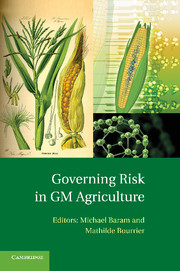Book contents
- Frontmatter
- Contents
- Preface
- Contributors
- 1 Governing Risk in GM Agriculture
- Part I Risk Governance and Public Discourse
- 2 Governance of GM Crop and Food Safety in the United States
- 3 The European Union's Regulatory Framework
- 4 The Dutch Approach to Safety Governance of GM Agriculture
- 5 Evolution of the Regulatory System for GM Crops in Brazil
- Part II Future Challenges
- Index
4 - The Dutch Approach to Safety Governance of GM Agriculture
Published online by Cambridge University Press: 01 March 2011
- Frontmatter
- Contents
- Preface
- Contributors
- 1 Governing Risk in GM Agriculture
- Part I Risk Governance and Public Discourse
- 2 Governance of GM Crop and Food Safety in the United States
- 3 The European Union's Regulatory Framework
- 4 The Dutch Approach to Safety Governance of GM Agriculture
- 5 Evolution of the Regulatory System for GM Crops in Brazil
- Part II Future Challenges
- Index
Summary
Introduction
The European approach to regulating genetically modified (GM) crops and foods has had unsettling consequences. It demonstrates that industrialists, politicians, scientific experts, and national regulatory authorities have failed to adequately address public concerns. These concerns arise from public awareness of the uncertainties and risks, and from lack of confidence in the studies performed by scientists and regulators. The concerns also reflect differences in perceptions and values, which have been shaped by recent history involving BSE, dioxin pollution, and food irradiation.
The expert committees that drafted European regulations on GM agriculture focused exclusively on potential safety concerns and designed the regulatory system accordingly. The experts targeted scientific issues such as the development of resistant “superbugs” and “superweeds,” as well as adverse effects on human and animal health. In contrast, the concerns of the public, NGOs, and environmentalists centered on longer-term environmental consequences, consumer choice, impacts on traditional farming, and other societal issues such as the influence of industry in the regulatory process and commercial pressures. In addition, food is a symbolic lifestyle factor, and familiarity with food products is important to European consumers including the Dutch citizens. Thus, the current European regulatory regime, which emphasizes technical expertise and narrowly ranks food safety as its top concern, has proven an inadequate approach to meeting public concerns.
These problems have been apparent in the Netherlands since 1996 when the Dutch government allowed the importation and limited processing of Monsanto's glyphosate-tolerant soybeans on the basis of scientific studies that showed the product to be safe for the environment and human health.
- Type
- Chapter
- Information
- Governing Risk in GM Agriculture , pp. 85 - 112Publisher: Cambridge University PressPrint publication year: 2010



